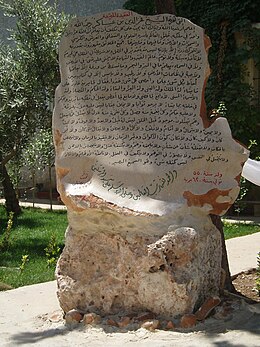Ibn Furak
Ibn Furak | |
|---|---|
| Title | Imam |
| Personal | |
| Born | Abu Bakr Muhammad 330 AH / 941 CE Mujarrad Maqalat al-Shaykh Abi al-Hasan al-Ash'ari ("Summary of Shaykh Abi al-Hasan al-Ash'ari's Treatises/Articles"), Mushkil al-Hadith wa Bayanuh ("Ambiguity of the Hadith and its Explanation") |
| Other names | Abu Bakr Muhammad bin al-Hasan bin Furak al-Shafi'i al-Ansari al-Isbahani |
| Muslim leader | |
Influenced by
| |
Influenced | |
| Part of a series on |
| Ash'arism |
|---|
 |
| Background |
Ibn Furak or Ibn Faurak (
Life
Birth and Education
Abu Bakr Muhammad bin al-Hasan bin Furak al-Shafi'i al-Ansari al-Isbahani was born in around 941 CE (330 AH) in
Career
Ibn Furak was the master and teacher of Al-Qushayri and Al-Bayhaqi, who both often mention Ibn Furak and praising him: "He (Ibn Furak) fought and defeated the deviant Anthropromorphists, the Karramiyya, then he travelled to Nishapur where he trained and taught generations of scholars. In Nishapur, he brought the transmissions of the narrators of Basra and Baghdad, both from Iraq, and also authored a number of books in various fields and Islamic sciences.[7]
Dispute and Death
The Karramiyya tried to initially have him executed by the Sultan Mahmud of Ghazni but failed after the Sultan summoned him to Ghazni and questioned him then exonerated him of the charges they had brought against him. However, upon returning from Ghazni, he was poisoned by the Karramiyya, fell on the road, and died in 1015 CE (406 AH) while another version says that he was attacked from behind from them. He was carried back to Nishapur and buried in al-Hira.[8][9]
Controversy over Ibn Furak
Al-Dhahabi mentions Ibn Furak in a short reference stating some inaccurate and defaming reports from Ibn Hazm, without questioning their intent where Ibn Furak was unjustly accused of claiming the prophethood ends after the death of Muhammad and other slanders that accuse him of disbelief. Despite this, Al-Dhahabi goes on to say: "Ibn Furak was better than Ibn Hazm, of a greater stature (rank among scholars) and better belief (creed)."[7]
"The Ash'ari belief (creed) is that our prophet (PBUH) is alive in his Blessed Grave and is the Messenger of Allah (God), forever until the End of times, this is literally, not metaphorically or symbolically, and the correct Belief is that he (Prophet Muhammad PBUH) was a Prophet when Adam (AR) was between Water and Clay, and his Prophethood remains until now, and shall ever remain."
Influences
Ibn Furak's works in "
His main work in the eyes of later generations is Tabaqat al-mutakallimin which is the main source to study
Early Islam scholars
| |||||||||||||||||||||||||||||||||||||||||||||||||||||||||||||||||||||||||||||||||||||||||||||||||||||||||||||||||||||||||||||||||||||||||||||||||||||||||||||||||||||||||||||||||||||||||||||||||||||||||||||||||||||||||||||||||||||||||||||||||||||||||||||||||||||||||||||||||||||||||||||||||||||||||||||||||||||||||||||||||||||||||||||||||||||||||||||||||||||||||||||||||||||||||||||||||||||||||||||||||||||||||||||||||||||||||||||||||||||||||||||||||||||||||||||||||||||||||||||||||||||||||||||||||||||||||||||||||||||||||||||||||||||||||||||||||||||||||||||||||||||||||||||||||||||||||||||||||||||||||||||||||||||||||||||||||||||||||||||||||||||||||||||||||||||||||||||||||||||||
References
- ^ ISBN 9004081186.
- ISBN 978-1851686636.
- ^ ISBN 9004081186.
- ISBN 978-90-04-23424-6.
- ^ ISBN 9781930409033.
- ISBN 9789004161214.
- ^ a b c Ayub, Zulfiqar (2 May 2015). THE BIOGRAPHIES OF THE ELITE LIVES OF THE SCHOLARS, IMAMS & HADITH MASTERS Biographies of The Imams & Scholars. Zulfiqar Ayub Publications. p. 155-6.
- ^ G.F. Haddad. "Ibn Furak". Archived from the original on February 10, 2020. Retrieved August 28, 2014.
- ^ a b "Furak". Retrieved August 28, 2014.
- ISBN 978-9-004158399.
